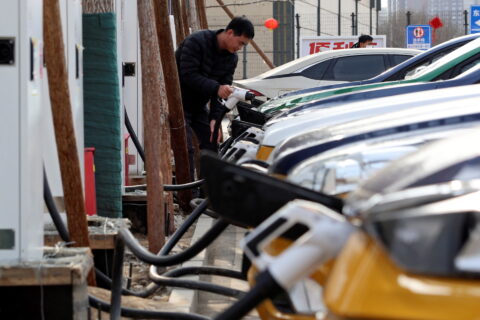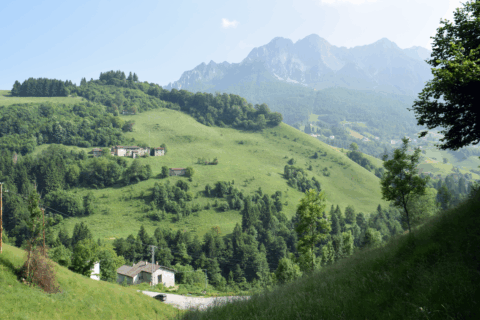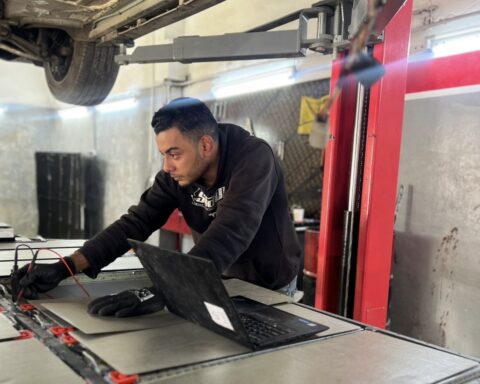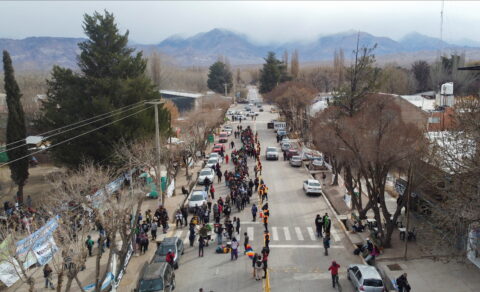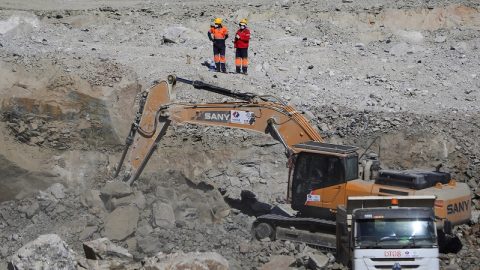As world leaders gathered in Dubai at the start of COP28 last December, the United Arab Emirates dropped a surprise headline-grabbing announcement. The host nation of the UN talks promised to put $30 billion into a new climate fund aimed at speeding up the energy transition and building climate resilience, especially in the Global South.
ALTÉRRA was billed as the world’s largest private investment vehicle to “focus entirely on climate solutions”. COP28 President Sultan Al-Jaber hailed its launch as “a defining moment” for creating a new era of international climate finance.
Yet four months later, one of the initial funds ALTÉRRA backed with a $300-million commitment agreed to buy a major fossil gas pipeline in North America, Climate Home has discovered.
In March, BlackRock’s “Global Infrastructure Fund IV” acquired half of the 475 km-long Portland Natural Gas Transmission System, with Morgan Stanley taking the rest in a deal worth $1.14 billion overall.
That acquisition would not have come as a surprise to the fund’s investors.
When US-based BlackRock pitched it to the State of Connecticut’s Investment Advisory Council back in 2022, the world’s biggest asset manager gave a flavour of where their money would likely end up. Its presentation – seen by Climate Home – featured a list of “indicative investments” including highly-polluting sectors such as gas power plants and transportation networks, liquefied natural gas (LNG), airports, terminals and shipping.
Climate Home does not know whether ALTÉRRA saw the same presentation, nor did the UAE firm respond directly to a question asking if it was aware before the COP28 announcement that the BlackRock fund might invest in those sectors.
An ALTÉRRA spokesperson told Climate Home its “investments seek to build the energy systems of tomorrow, while supporting the transition of existing energy infrastructure towards a just and managed clean energy ecosystem”.
In addition to the gas pipeline, BlackRock’s infrastructure fund has so far invested in carbon capture, waste management, utilities maintenance services, telecom infrastructure, data centres and the production of industrial gases, according to regulatory filings, a BlackRock job advertisement and press reports accessed by Climate Home.
A BlackRock spokesperson said its global infrastructure fund franchise “targets investments in solutions across the energy transition value chain, driven by the long-term trends of decarbonization, decentralization, and digitalization to support the stability and affordability of energy supply around the world”.
Andreas Sieber, associate director of global policy and campaigns at climate advocacy group 350.org, said Climate Home’s findings “confirm our worst fears”. “The ALTÉRRA fund uses a masquerade of green progress while funnelling investment into fossil fuel pipelines and gas projects, which are the biggest causes of the climate crisis,” he told Climate Home.
Climate finance is a hot topic at UN negotiations, with countries expected to set a new global goal at COP29 in Baku, Azerbaijan, this November, amid persistent calls for higher amounts to help poorer nations boost clean energy production.
The COP28 presidency said last year that ALTÉRRA would “drive forward international efforts to create a fairer climate finance system, with an emphasis on improving access to funding for the Global South”. Al-Jaber added that “its launch reflects… the UAE’s efforts to make climate finance available, accessible and affordable”.
But the sparse details provided at the time prompted climate justice activists to question the real impact it would have in countries that most need financial support to adopt clean energy and adapt to a warming world. Only about a sixth of the fund – $5 billion – was earmarked as “capital to incentivize investment into the Global South”.
Follow the money
ALTÉRRA is a so-called ‘fund of funds’. Instead of directly investing money in individual companies or assets, it puts its cash into a series of funds run by other investment firms. At COP28, it committed a total of $6.5 billion to funds managed by BlackRock, Brookfield and TPG, without setting out how the remaining $23.5 billion would be spent.
Since then, ALTÉRRA has not announced any further investments. Its chief executive, Majid Al Suwaidi, told Bloomberg this month that the fund is “actively planning the next phase of allocations”, without giving further details.
The launch of #ALTÉRRA marks the start of three unique alliances with global asset managers, @Brookfield, @BlackRock, and @tpg.
Together, we share the same vision, to bridge the climate investment gap and finance a new climate economy. pic.twitter.com/7yEXOyZqpK
— ALTÉRRA (@Alterrafund) December 1, 2023
Most of the funds picked by ALTÉRRA remain at an early stage and have yet to announce completed transactions or are still trying to raise more capital from investors. The most notable exception is BlackRock’s fourth Global Infrastructure Fund. By the time it won the $300-million commitment from ALTÉRRA in Dubai, the vehicle was ready to deploy its money.
ALTÉRRA told Climate Home its investment in the BlackRock vehicle is in line with its goals of getting climate finance “flowing quickly and at scale” and of partnering “with funds that invest in the energy transition and accelerate pathways to net-zero”.
Announcing its first $4.5-billion closing in October 2022, BlackRock said the fund would “continue to target investments in climate solutions, while also supporting the infrastructure needed to ensure a stable, affordable energy supply during the transition”.
In private conversations with potential investors, the asset manager spelled out more clearly what that meant.
Its presentation to the State of Connecticut in December 2022 showed that the fund would not only invest in things like renewable energy, electrification and battery storage, but also in fossil gas power plants and pipelines, LNG and transportation infrastructure like airports, shipping and terminals.
In line with this strategy, BlackRock agreed a deal this March for its Global Infrastructure Fund IV to acquire half of the Portland Natural Gas Transmission System (PNGT), a fossil gas pipeline stretching from the Canadian border across New England in the United States to Maine and Massachusetts.
When it began operations in 1999, the pipeline helped shift New England’s power generation away from coal and oil, but it has also created a stronger dependency on fossil gas, leaving citizens vulnerable to price spikes. The region is now planning to accelerate the rollout of renewable energy sources.
The PNGT was not the first fossil fuel infrastructure the BlackRock team behind the Global Infrastructure Fund had snapped up. In a written testimony submitted this March to the State of New Hampshire, a senior executive listed a dozen oil and gas pipelines backed by earlier rounds of the fund. They included one operated by ADNOC, the UAE state-owned oil company whose CEO is Sultan Al-Jaber, COP28 president and chair of ALTÉRRA’s board.
Responding to Climate Home’s findings on where ALTÉRRA’s money is going, Mohamed Adow, director of Nairobi-based think-tank Power Shift Africa, said it is “extremely concerning to see a fund hailed by a COP president as a solution to the climate crisis investing in fossil fuels”.
“This needs to be a wake-up call to the world that these funds created by COP hosts are little more than PR stunts designed to greenwash the activities of fossil fuel-producing nations,” he added.
Oil-backed carbon capture
BlackRock does not disclose the infrastructure fund’s complete portfolio, but it has invested another $550 million in Stratos, the world’s biggest direct air capture (DAC) project being developed in a joint venture with oil giant Occidental. The plant under construction in Texas promises to suck as much as 500,000 tonnes of carbon dioxide out of the atmosphere annually and bury it underground.
Its proponents see DAC as a key technology to balance out emissions in the race to achieve net zero by 2050, although so far it remains expensive and largely unproven at scale. Stratos won a grant from the US government to fast-track the construction of the facility, and it has struck deals to sell carbon offsets generated in future from the plant with corporate giants like Amazon.
Scottish oil-town plan for green jobs sparks climate campers’ anger over local park
When the DAC partnership was announced last November, BlackRock CEO Larry Fink said Stratos “represents an incredible investment opportunity for BlackRock’s clients… and underscores the critical role of American energy companies in climate technology innovation”.
But Stratos’ critics have questioned Occidental’s motivations and dismissed its DAC investments as a greenwashing ploy to keep pumping oil and slow down the transition away from fossil fuels.
“We believe that our direct capture technology is going to be the technology that helps to preserve our industry over time,” Vicki Hollub, Occidental’s chief executive, told the CERAWeek energy industry conference last year. “This gives our industry a license to continue to operate for the 60, 70, 80 years that I think it’s going to be very much needed.”
Call for safeguards
While BlackRock’s infrastructure fund deploys its cash largely in the Global North, ALTÉRRA’s promised investments in developing countries are still taking shape.
Brookfield in June launched a new “Catalytic Transition Fund” backed by ALTÉRRA with a $1-billion commitment. The fund’s stated focus is “directing capital into clean energy and transition assets in emerging economies”.
Climate Home asked ALTÉRRA if it had adopted any exclusion policies that would, for example, rule out investment in certain types of fossil fuels.
The UAE fund did not respond to the question, but a spokesperson said its investment approach is aligned with the goal “of accelerating the climate transition, with a focus on clean energy, industry decarbonization, sustainable living, and climate technologies”.

Climate activists protest against fossil fuels during COP28 in Dubai in December 2023. REUTERS/Thomas Mukoya
350.org’s Sieber called on Al-Jaber – who was widely criticised by green groups for his dual role as president of COP28 and head of a fossil fuel corporation – to “act swiftly to enforce stringent safeguards” for ALTÉRRA’s investments.
“The UAE is on the brink of losing the little credibility it still has left in addressing the urgency of the climate emergency,” Sieber added. “The world, especially communities who are being hit the hardest by climate impacts every day, cannot afford to have one more cent invested in fossil fuels.”
The key question now is whether Azerbaijan – the host of COP29 and itself a substantial producer and exporter of oil and gas – will do things differently. Last week, it announced a new voluntary fund that it said will invest at least $1 billion for emissions reduction projects in developing countries. Baku is hoping to secure contributions for it from fossil-fuel producing nations and companies.
Power Shift Africa’s Adow said developing countries need state-backed climate finance from rich nations, negotiated through the UN climate process, and “not just cooked up in voluntary schemes”. That funding “can be used where the need is greatest, not just where it might make most money for some private profit-seeking businesses,” he added.
(Reporting by Matteo Civillini; fact-checking by Sebastián Rodríguez; editing by Megan Rowling and Sebastián Rodríguez)
The post UAE’s ALTÉRRA invests in fund backing fossil gas despite “climate solutions” pledge appeared first on Climate Home News.
UAE’s ALTÉRRA invests in fund backing fossil gas despite “climate solutions” pledge
Climate Change
Cropped 25 February 2026: Food inflation strikes | El Niño looms | Biodiversity talks stagnate
We handpick and explain the most important stories at the intersection of climate, land, food and nature over the past fortnight.
This is an online version of Carbon Brief’s fortnightly Cropped email newsletter.
Subscribe for free here.
Key developments
Food inflation on the rise
DELUGE STRIKES FOOD: Extreme rainfall and flooding across the Mediterranean and north Africa has “battered the winter growing regions that feed Europe…threatening food price rises”, reported the Financial Times. Western France has “endured more than 36 days of continuous rain”, while farmers’ associations in Spain’s Andalusia estimate that “20% of all production has been lost”, it added. Policy expert David Barmes told the paper that the “latest storms were part of a wider pattern of climate shocks feeding into food price inflation”.
-
Sign up to Carbon Brief’s free “Cropped” email newsletter. A fortnightly digest of food, land and nature news and views. Sent to your inbox every other Wednesday.
NO BEEF: The UK’s beef farmers, meanwhile, “face a double blow” from climate change as “relentless rain forces them to keep cows indoors”, while last summer’s drought hit hay supplies, said another Financial Times article. At the same time, indoor growers in south England described a 60% increase in electricity standing charges as a “ticking timebomb” that could “force them to raise their prices or stop production, which will further fuel food price inflation”, wrote the Guardian.
‘TINDERBOX’ AND TARIFFS: A study, covered by the Guardian, warned that major extreme weather and other “shocks” could “spark social unrest and even food riots in the UK”. Experts cited “chronic” vulnerabilities, including climate change, low incomes, poor farming policy and “fragile” supply chains that have made the UK’s food system a “tinderbox”. A New York Times explainer noted that while trade could once guard against food supply shocks, barriers such as tariffs and export controls – which are being “increasingly” used by politicians – “can shut off that safety valve”.
El Niño looms
NEW ENSO INDEX: Researchers have developed a new index for calculating El Niño, the large-scale climate pattern that influences global weather and causes “billions in damages by bringing floods to some regions and drought to others”, reported CNN. It added that climate change is making it more difficult for scientists to observe El Niño patterns by warming up the entire ocean. The outlet said that with the new metric, “scientists can now see it earlier and our long-range weather forecasts will be improved for it.”
WARMING WARNING: Meanwhile, the US Climate Prediction Center announced that there is a 60% chance of the current La Niña conditions shifting towards a neutral state over the next few months, with an El Niño likely to follow in late spring, according to Reuters. The Vibes, a Malaysian news outlet, quoted a climate scientist saying: “If the El Niño does materialise, it could possibly push 2026 or 2027 as the warmest year on record, replacing 2024.”
CROP IMPACTS: Reuters noted that neutral conditions lead to “more stable weather and potentially better crop yields”. However, the newswire added, an El Niño state would mean “worsening drought conditions and issues for the next growing season” to Australia. El Niño also “typically brings a poor south-west monsoon to India, including droughts”, reported the Hindu’s Business Line. A 2024 guest post for Carbon Brief explained that El Niño is linked to crop failure in south-eastern Africa and south-east Asia.
News and views
- DAM-AG-ES: Several South Korean farmers filed a lawsuit against the country’s state-owned utility company, “seek[ing] financial compensation for climate-related agricultural damages”, reported United Press International. Meanwhile, a national climate change assessment for the Philippines found that the country “lost up to $219bn in agricultural damages from typhoons, floods and droughts” over 2000-10, according to Eco-Business.
- SCORCHED GRASS: South Africa’s Western Cape province is experiencing “one of the worst droughts in living memory”, which is “scorching grass and killing livestock”, said Reuters. The newswire wrote: “In 2015, a drought almost dried up the taps in the city; farmers say this one has been even more brutal than a decade ago.”
- NOUVELLE VEG: New guidelines published under France’s national food, nutrition and climate strategy “urged” citizens to “limit” their meat consumption, reported Euronews. The delayed strategy comes a month after the US government “upended decades of recommendations by touting consumption of red meat and full-fat dairy”, it noted.
- COURTING DISASTER: India’s top green court accepted the findings of a committee that “found no flaws” in greenlighting the Great Nicobar project that “will lead to the felling of a million trees” and translocating corals, reported Mongabay. The court found “no good ground to interfere”, despite “threats to a globally unique biodiversity hotspot” and Indigenous tribes at risk of displacement by the project, wrote Frontline.
- FISH FALLING: A new study found that fish biomass is “falling by 7.2% from as little as 0.1C of warming per decade”, noted the Guardian. While experts also pointed to the role of overfishing in marine life loss, marine ecologist and study lead author Dr Shahar Chaikin told the outlet: “Our research proves exactly what that biological cost [of warming] looks like underwater.”
- TOO HOT FOR COFFEE: According to new analysis by Climate Central, countries where coffee beans are grown “are becoming too hot to cultivate them”, reported the Guardian. The world’s top five coffee-growing countries faced “57 additional days of coffee-harming heat” annually because of climate change, it added.
Spotlight
Nature talks inch forward
This week, Carbon Brief covers the latest round of negotiations under the UN Convention on Biological Diversity (CBD), which occurred in Rome over 16-19 February.
The penultimate set of biodiversity negotiations before October’s Conference of the Parties ended in Rome last week, leaving plenty of unfinished business.
The CBD’s subsidiary body on implementation (SBI) met in the Italian capital for four days to discuss a range of issues, including biodiversity finance and reviewing progress towards the nature targets agreed under the Kunming-Montreal Global Biodiversity Framework (GBF).
However, many of the major sticking points – particularly around finance – will have to wait until later this summer, leaving some observers worried about the capacity for delegates to get through a packed agenda at COP17.
The SBI, along with the subsidiary body on scientific, technical and technological advice (SBSTTA) will both meet in Nairobi, Kenya, later this summer for a final round of talks before COP17 kicks off in Yerevan, Armenia, on 19 October.
Money talks
Finance for nature has long been a sticking point at negotiations under the CBD.
Discussions on a new fund for biodiversity derailed biodiversity talks in Cali, Colombia, in autumn 2024, requiring resumed talks a few months later.
Despite this, finance was barely on the agenda at the SBI meetings in Rome. Delegates discussed three studies on the relationship between debt sustainability and implementation of nature plans, but the more substantive talks are set to take place at the next SBI meeting in Nairobi.
Several parties “highlighted concerns with the imbalance of work” on finance between these SBI talks and the next ones, reported Earth Negotiations Bulletin (ENB).
Lim Li Ching, senior researcher at Third World Network, noted that tensions around finance permeated every aspect of the talks. She told Carbon Brief:
“If you’re talking about the gender plan of action – if there’s little or no financial resources provided to actually put it into practice and implement it, then it’s [just] paper, right? Same with the reporting requirements and obligations.”
Monitoring and reporting
Closely linked to the issue of finance is the obligations of parties to report on their progress towards the goals and targets of the GBF.
Parties do so through the submission of national reports.
Several parties at the talks pointed to a lack of timely funding for driving delays in their reporting, according to ENB.
A note released by the CBD Secretariat in December said that no parties had submitted their national reports yet; by the time of the SBI meetings, only the EU had. It further noted that just 58 parties had submitted their national biodiversity plans, which were initially meant to be published by COP16, in October 2024.
Linda Krueger, director of biodiversity and infrastructure policy at the environmental not-for-profit Nature Conservancy, told Carbon Brief that despite the sparse submissions, parties are “very focused on the national report preparation”. She added:
“Everybody wants to be able to show that we’re on the path and that there still is a pathway to getting to 2030 that’s positive and largely in the right direction.”
Watch, read, listen
NET LOSS: Nigeria’s marine life is being “threatened” by “ghost gear” – nets and other fishing equipment discarded in the ocean – said Dialogue Earth.
COMEBACK CAUSALITY: A Vox long-read looked at whether Costa Rica’s “payments for ecosystem services” programme helped the country turn a corner on deforestation.
HOMEGROWN GOALS: A Straits Times podcast discussed whether import-dependent Singapore can afford to shelve its goal to produce 30% of its food locally by 2030.
‘RUSTING’ RIVERS: The Financial Times took a closer look at a “strange new force blighting the [Arctic] landscape”: rivers turning rust-orange due to global warming.
New science
- Lakes in the Congo Basin’s peatlands are releasing carbon that is thousands of years old | Nature Geoscience
- Natural non-forest ecosystems – such as grasslands and marshlands – were converted for agriculture at four times the rate of land with tree cover between 2005 and 2020 | Proceedings of the National Academy of Sciences
- Around one-quarter of global tree-cover loss over 2001-22 was driven by cropland expansion, pastures and forest plantations for commodity production | Nature Food
In the diary
- 2-6 March: UN Food and Agriculture Organization regional conference for Latin America and Caribbean | Brasília
- 5 March: Nepal general elections
- 9-20 March: First part of the thirty-first session of the International Seabed Authority (ISA) | Kingston, Jamaica
Cropped is researched and written by Dr Giuliana Viglione, Aruna Chandrasekhar, Daisy Dunne, Orla Dwyer and Yanine Quiroz.
Please send tips and feedback to cropped@carbonbrief.org
The post Cropped 25 February 2026: Food inflation strikes | El Niño looms | Biodiversity talks stagnate appeared first on Carbon Brief.
Cropped 25 February 2026: Food inflation strikes | El Niño looms | Biodiversity talks stagnate
Climate Change
Battery passport plan aims to clean up the industry powering clean energy
For millions of consumers, the sustainability scheme stickers found on everything from bananas to chocolate bars and wooden furniture are a way to choose products that are greener and more ethical than some of the alternatives.
Inga Petersen, executive director of the Global Battery Alliance (GBA), is on a mission to create a similar scheme for one of the building blocks of the transition from fossil fuels to clean energy systems: batteries.
“Right now, it’s a race to the bottom for whoever makes the cheapest battery,” Petersen told Climate Home News in an interview.
The GBA is working with industry, international organisations, NGOs and governments to establish a sustainable and transparent battery value chain by 2030.
“One of the things we’re trying to do is to create a marketplace where products can compete on elements other than price,” Petersen said.
Under the GBA’s plan, digital product passports and traceability would be used to issue product-level sustainability certifications, similar to those commonplace in other sectors such as forestry, Petersen said.
Managing battery boom’s risks
Over the past decade, battery deployment has increased 20-fold, driven by record-breaking electric vehicle (EV) sales and a booming market for batteries to store intermittent renewable energy.
Falling prices have been instrumental to the rapid expansion of the battery market. But the breakneck pace of growth has exposed the potential environmental and social harms associated with unregulated battery production.
From South America to Zimbabwe and Indonesia, mineral extraction and refining has led to social conflict, environmental damage, human rights violations and deforestation. In Indonesia, the nickel industry is powered by coal while in Europe, production plants have been met with strong local opposition over pollution concerns.
“We cannot manage these risks if we don’t have transparency,” Petersen said.
The GBA was established in 2017 in response to concerns about the battery industry’s impact as demand was forecast to boom and reports of child labour in the cobalt mines of the Democratic Republic of the Congo made headlines.
The alliance’s initial 19 members recognised that the industry needed to scale rapidly but with “social, environmental and governance guardrails”, said Petersen, who previously worked with the UN Environment Programme to develop guiding principles to minimise the environmental impact of mining.

Digital battery passport
Today, the alliance is working to develop a global certification scheme that will recognise batteries that meet minimum thresholds across a set of environmental, social and governance benchmarks it has defined along the entire value chain.
Participating mines, manufacturing plants and recycling facilities will have to provide data for their greenhouse gas emissions as well as how they perform against benchmarks for assessing biodiversity loss, pollution, child and forced labour, community impacts and respect for the rights of Indigenous peoples, for example.
The data will be independently verified, scored, aggregated and recorded on a battery passport – a digital record of the battery’s composition, which will include the origin of its raw materials and its performance against the GBA’s sustainability benchmarks.
The scheme is due to launch in 2027.
A carrot and a stick
Since the start of the year, some of the world’s largest battery companies have been voluntarily participating in the biggest pilot of the scheme to date.
More than 30 companies across the EV battery and stationary storage supply chains are involved, among them Chinese battery giants CATL and BYD subsidiary FinDreams Battery, miner Rio Tinto, battery producers Samsung SDI and Siemens, automotive supplier Denso and Tesla.
Petersen said she was “thrilled” about support for the scheme. Amid a growing pushback against sustainability rules and standards, “these companies are stepping up to send a public signal that they are still committed to a sustainable and responsible battery value chain,” she said.

There are other motivations for battery producers to know where components in their batteries have come from and whether they have been produced responsibly.
In 2023, the EU adopted a law regulating the batteries sold on its market.
From 2027, it mandates all batteries to meet environmental and safety criteria and to have a digital passport accessed via a QR code that contains information about the battery’s composition, its carbon footprint and its recycling content.
The GBA certification is not intended as a compliance instrument for the EU law but it will “add a carrot” by recognising manufacturers that go beyond meeting the bloc’s rules on nature and human rights, Petersen said.
Raising standards in complex supply chain
But challenges remain, in part due to the complexity of battery supply chains.
In the case of timber, “you have a single input material but then you have a very complex range of end products. For batteries, it’s almost the reverse,” Petersen said.
The GBA wants its certification scheme to cover all critical minerals present in batteries, covering dozens of different mining, processing and manufacturing processes and hundreds of facilities.
“One of the biggest impacts will be rewarding the leading performers through preferential access to capital, for example, with investors choosing companies that are managing their risk responsibly and transparently,” Petersen said.
It could help influence public procurement and how companies, such as EV makers, choose their suppliers, she added. End consumers will also be able to access a summary of the GBA’s scores when deciding which product to buy.
US, Europe rush to build battery supply chain
Today, the GBA has more than 150 members across the battery value chain, including more than 50 companies, of which over a dozen are Chinese firms.
China produces over three-quarters of batteries sold globally and it dominates the world’s battery recycling capacity, leaving the US and Europe scrambling to reduce their dependence on Beijing by building their own battery supply chains.
Petersen hopes the alliance’s work can help build trust in the sector amid heightened geopolitical tensions. “People want to know where the materials are coming from and which actors are involved,” she said.
At the same time, companies increasingly recognise that failing to manage sustainability risks can threaten their operations. Protests over environmental concerns have shut down mines and battery factories across the world.
“Most companies know that and that’s why they’re making these efforts,” Petersen added.
The post Battery passport plan aims to clean up the industry powering clean energy appeared first on Climate Home News.
Battery passport plan aims to clean up the industry powering clean energy
Climate Change
Reheating plastic food containers: what science says about microplastics and chemicals in ready meals
How often do you eat takeaway food? What about pre-prepared ready meals? Or maybe just microwaving some leftovers you had in the fridge? In any of these cases, there’s a pretty good chance the container was made out of plastic. Considering that they can be an extremely affordable option, are there any potential downsides we need to be aware of? We decided to investigate.
Scientific research increasingly shows that heating food in plastic packaging can release microplastics and plastic chemicals into the food we eat. A new Greenpeace International review of peer-reviewed studies finds that microwaving plastic food containers significantly increases this release, raising concerns about long-term human health impacts. This article summarises what the science says, what remains uncertain, and what needs to change.
There’s no shortage of research showing how microplastics and nanoplastics have made their way throughout the environment, from snowy mountaintops and Arctic ice, into the beetles, slugs, snails and earthworms at the bottom of the food chain. It’s a similar story with humans, with microplastics found in blood, placenta, lungs, liver and plenty of other places. On top of this, there’s some 16,000 chemicals known to be either present or used in plastic, with a bit over a quarter of those chemicals already identified as being of concern. And there are already just under 1,400 chemicals that have been found in people.
Not just food packaging, but plenty of household items either contain or are made from plastic, meaning they potentially could be a source of exposure as well. So if microplastics and chemicals are everywhere (including inside us), how are they getting there? Should we be concerned that a lot of our food is packaged in plastic?
Greenpeace analysis of 24 articles in peer-reviewed scientific journals found that the plastics we use to package our food are directly risking our health.
Heating food in plastic packaging dramatically increases the levels of microplastics and chemicals that leach into our food.
Plastic food packaging: the good, the bad, and the ugly
The growing trend towards ready meals, online shopping and restaurant delivery, and away from home-prepared meals and individual grocery shopping, is happening in every region of the world. Since the first microwaveable TV dinners were introduced in the US in the 1950s to sell off excess stock of turkey meat after Thanksgiving holidays, pre-packaged ready meals have grown hugely in sales. The global market is worth $190bn in 2025, and is expected to reach a total volume of 71.5 million tonnes by 2030. It’s also predicted that the top five global markets for convenience food (China, USA, Japan, Mexico and Russia) will remain relatively unchanged up to 2030, with the most revenue in 2019 generated by the North America region.
A new report from Greenpeace International set out to analyse articles in peer-reviewed, scientific journals to look at what exactly the research has to say about plastic food packaging and food contact plastics.
Here’s what we found.
Our review of 24 recent articles highlights a consistent picture that regulators, businesses and
consumers should be concerned about: when food is packaged in plastic and then microwaved, this significantly increases the risk of both microplastic and chemical release, and that these microplastics and chemicals will leach into the food inside the packaging.
And not just some, but a lot of microplastics and chemicals.
When polystyrene and polypropylene containers filled with water were microwaved after being stored in the fridge or freezer, one study found they released anywhere between 100,000-260,000 microplastic particles, and another found that five minutes of microwave heating could release between 326,000-534,000 particles into food.
Similarly there are a wide range of chemicals that can be and are released when plastic is heated. Across different plastic types, there are estimated to be around 16,000 different chemicals that can either be used or present in plastics, and of these around 4,200 are identified as being hazardous, whilst many others lack any form of identification (hazardous or otherwise) at all.
The research also showed that 1,396 food contact plastic chemicals have been found in humans, several of which are known to be hazardous to human health. At the same time, there are many chemicals for which no research into the long-term effects on human health exists.
Ultimately, we are left with evidence pointing towards increased release of microplastics and plastic chemicals into food from heating, the regular migration of microplastics and chemicals into food, and concerns around what long-term impacts these substances have on human health, which range from uncertain to identified harm.

The known unknowns of plastic chemicals and microplastics
The problem here (aside from the fact that plastic chemicals are routinely migrating into our food), is that often we don’t have any clear research or information on what long-term impacts these chemicals have on human health. This is true of both the chemicals deliberately used in plastic production (some of which are absolutely toxic, like antimony which is used to make PET plastic), as well as in what’s called non-intentionally added substances (NIAS).
NIAS refers to chemicals which have been found in plastic, and typically originate as impurities, reaction by-products, or can even form later when meals are heated. One study found that a UV stabiliser plastic additive reacted with potato starch when microwaved to create a previously unknown chemical compound.
We’ve been here before: lessons from tobacco, asbestos and lead
Although none of this sounds particularly great, this is not without precedence. Between what we do and don’t know, waiting for perfect evidence is costly both economically and in terms of human health. With tobacco, asbestos, and lead, a similar story to what we’re seeing now has played out before. After initial evidence suggesting problems and toxicity, lobbyists from these industries pushed back to sow doubt about the scientific validity of the findings, delaying meaningful action. And all the while, between 1950-2000, tobacco alone led to the deaths of around 60 million people. Whilst distinguishing between correlation and causation, and finding proper evidence is certainly important, it’s also important to take preventative action early, rather than wait for more people to be hurt in order to definitively prove the point.
Where to from here?
This is where adopting the precautionary principle comes in. This means shifting the burden of proof away from consumers and everyone else to prove that a product is definitely harmful (e.g. it’s definitely this particular plastic that caused this particular problem), and onto the manufacturer to prove that their product is definitely safe. This is not a new idea, and plenty of examples of this exist already, such as the EU’s REACH regulation, which is centred around the idea of “no data, no market” – manufacturers are obligated to provide data demonstrating the safety of their product in order to be sold.

Greenpeace analysis of 24 articles in peer-reviewed scientific journals found that the plastics we use to package our food are directly risking our health.
Heating food in plastic packaging dramatically increases the levels of microplastics and chemicals that leach into our food.
But as it stands currently, the precautionary principle isn’t applied to plastics. For REACH in particular, plastics are assessed on a risk-based approach, which means that, as the plastic industry itself has pointed out, something can be identified as being extremely hazardous, but is still allowed to be used in production if the leached chemical stays below “safe” levels, despite that for some chemicals a “safe” low dose is either undefined, unknown, or doesn’t exist.
A better path forward
Governments aren’t acting fast enough to reduce our exposure and protect our health. There’s no shortage of things we can do to improve this situation. The most critical one is to make and consume less plastic. This is a global problem that requires a strong Global Plastics Treaty that reduces global plastic production by at least 75% by 2040 and eliminates harmful plastics and chemicals. And it’s time that corporations take this growing threat to their customers’ health seriously, starting with their food packaging and food contact products. Here are a number of specific actions policymakers and companies can take, and helpful hints for consumers.
Policymakers & companies
- Implement the precautionary principle:
- For policymakers – Stop the use of hazardous plastics and chemicals, on the basis of their intrinsic risk, rather than an assessment of “safe” levels of exposure.
- For companies – Commit to ensure that there is a “zero release” of microplastics and hazardous chemicals from packaging into food, alongside an Action Plan with milestones to achieve this by 2035
- Stop giving false assurances to consumers about “microwave safe” containers
- Stop the use of single-use and plastic packaging, and implement policies and incentives to foster the uptake of reuse systems and non-toxic packaging alternatives.
Consumers
- Encourage your local supermarkets and shops to shift away from plastic where possible
- Avoid using plastic containers when heating/reheating food
- Use non-plastic refill containers
Trying to dodge plastic can be exhausting. If you’re feeling overwhelmed, you’re not alone. We can only do so much in this broken plastic-obsessed system. Plastic producers and polluters need to be held accountable, and governments need to act faster to protect the health of people and the planet. We urgently need global governments to accelerate a justice-centred transition to a healthier, reuse-based, zero-waste future. Ensure your government doesn’t waste this once-in-a-generation opportunity to end the age of plastic.
-
Greenhouse Gases7 months ago
Guest post: Why China is still building new coal – and when it might stop
-
Climate Change7 months ago
Guest post: Why China is still building new coal – and when it might stop
-

 Greenhouse Gases2 years ago
Greenhouse Gases2 years ago嘉宾来稿:满足中国增长的用电需求 光伏加储能“比新建煤电更实惠”
-
Climate Change2 years ago
Bill Discounting Climate Change in Florida’s Energy Policy Awaits DeSantis’ Approval
-
Climate Change2 years ago
Spanish-language misinformation on renewable energy spreads online, report shows
-

 Climate Change2 years ago
Climate Change2 years ago嘉宾来稿:满足中国增长的用电需求 光伏加储能“比新建煤电更实惠”
-
Climate Change Videos2 years ago
The toxic gas flares fuelling Nigeria’s climate change – BBC News
-

 Carbon Footprint2 years ago
Carbon Footprint2 years agoUS SEC’s Climate Disclosure Rules Spur Renewed Interest in Carbon Credits


